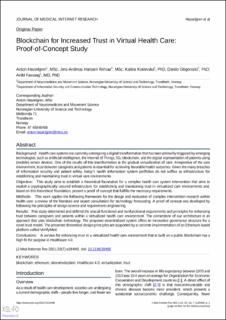| dc.contributor.author | Hasselgren, Anton | |
| dc.contributor.author | Rensaa, Jens-Andreas Hanssen | |
| dc.contributor.author | Kralevska, Katina | |
| dc.contributor.author | Gligoroski, Danilo | |
| dc.contributor.author | Faxvaag, Arild | |
| dc.date.accessioned | 2022-03-29T08:39:54Z | |
| dc.date.available | 2022-03-29T08:39:54Z | |
| dc.date.created | 2022-01-04T14:41:20Z | |
| dc.date.issued | 2021 | |
| dc.identifier.citation | Journal of Medical Internet Research. 2021, 23 (7), 1-15. | en_US |
| dc.identifier.issn | 1438-8871 | |
| dc.identifier.uri | https://hdl.handle.net/11250/2988200 | |
| dc.description.abstract | Background: Health care systems are currently undergoing a digital transformation that has been primarily triggered by emerging technologies, such as artificial intelligence, the Internet of Things, 5G, blockchain, and the digital representation of patients using (mobile) sensor devices. One of the results of this transformation is the gradual virtualization of care. Irrespective of the care environment, trust between caregivers and patients is essential for achieving favorable health outcomes. Given the many breaches of information security and patient safety, today’s health information system portfolios do not suffice as infrastructure for establishing and maintaining trust in virtual care environments. Objective: This study aims to establish a theoretical foundation for a complex health care system intervention that aims to exploit a cryptographically secured infrastructure for establishing and maintaining trust in virtualized care environments and, based on this theoretical foundation, present a proof of concept that fulfills the necessary requirements. Methods: This work applies the following framework for the design and evaluation of complex intervention research within health care: a review of the literature and expert consultation for technology forecasting. A proof of concept was developed by following the principles of design science and requirements engineering. Results: This study determined and defined the crucial functional and nonfunctional requirements and principles for enhancing trust between caregivers and patients within a virtualized health care environment. The cornerstone of our architecture is an approach that uses blockchain technology. The proposed decentralized system offers an innovative governance structure for a novel trust model. The presented theoretical design principles are supported by a concrete implementation of an Ethereum-based platform called VerifyMed. Conclusions: A service for enhancing trust in a virtualized health care environment that is built on a public blockchain has a high fit for purpose in Healthcare 4.0. | en_US |
| dc.language.iso | eng | en_US |
| dc.publisher | JMIR Publications | en_US |
| dc.rights | Navngivelse 4.0 Internasjonal | * |
| dc.rights.uri | http://creativecommons.org/licenses/by/4.0/deed.no | * |
| dc.title | Blockchain for increased trust in virtual health care: Proof-of-concept study | en_US |
| dc.type | Peer reviewed | en_US |
| dc.type | Journal article | en_US |
| dc.description.version | publishedVersion | en_US |
| dc.source.pagenumber | 1-15 | en_US |
| dc.source.volume | 23 | en_US |
| dc.source.journal | Journal of Medical Internet Research | en_US |
| dc.source.issue | 7 | en_US |
| dc.identifier.doi | 10.2196/28496 | |
| dc.identifier.cristin | 1974486 | |
| cristin.ispublished | true | |
| cristin.fulltext | original | |
| cristin.qualitycode | 2 | |

